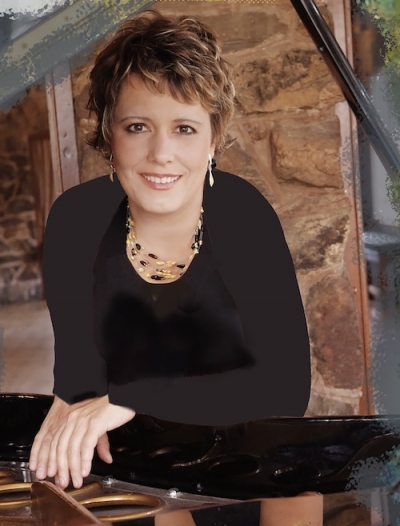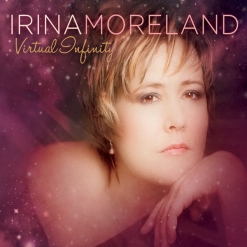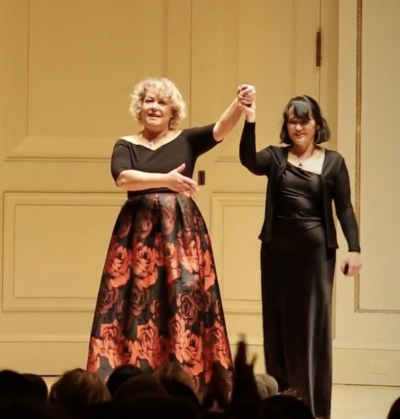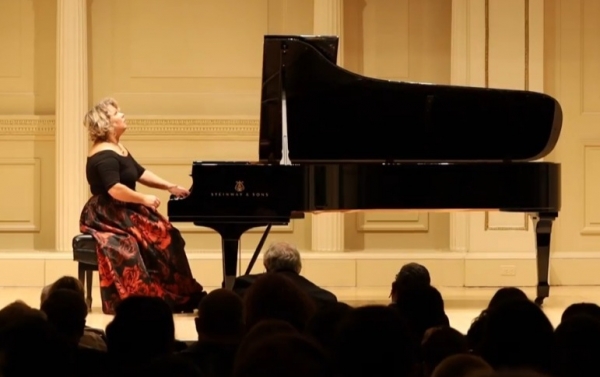Over the past several years, I've been asked to review an increasing number of classical piano albums - something I really enjoy doing. Last year, I reviewed two albums and a concert performance by Irina Moreland, an amazing pianist who received her training in Central Asia, St. Petersburg, and Colorado and teaches at The School of Music at Colorado Christian University. I wanted to get to know Irina better, so we did this interview via email in early 2023. Enjoy!
KP: Hi Irina! How is the start of the new year for you?
IM: I do feel more relaxed than in December..
KP: That's always good! I reviewed two of your albums last year, Debussy Preludes, Book 2, which was new, and Irina Moreland Live, which was released in 2018. How many albums have you recorded altogether?
IM: I have released three albums. The third is Virtual Infinity, which is crossover classical and rock styles. That was my first album, which was released in 2014.
KP: I'll have to check that one out! As a classical artist, how do you decide which music to record?
IM: When I choose a project, I focus on composers I admire, or sometimes I like to create something new that people might like to listen to.
My crossover genre album was experimental, since I wanted to produce something similar to Vanessa-Mae (the crossover violin player).
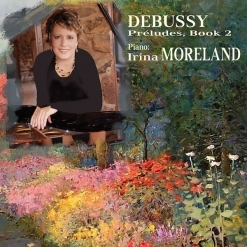
Click on the "Live" and "Debussy" covers
to go to Kathy's reviews.
My
Live album came from a desire to release my efforts from my Doctoral program. Those were chamber works for which I received the Scholarship Award at University Colorado at Boulder.
And finally, my
Debussy, Preludes Book 2 album fulfilled my dream of many years to record my favorite composer.
I would love to record jazz and my own compositional album soon. I wish I could play in a wider variety of musical styles. Classical music is highly intellectual, and is probably the most desirable for me, although I love all genres of music. I would like to play movie scoring music with other instruments (my favorite is cello).
KP: I love piano and cello together!
You hold two Doctorate degrees in music. Where did you study?
IM: I studied at the Doctoral level at Qazaq State Conservatory, St. Petersburg State Conservatory and Colorado University at Boulder (Colorado).
KP: Where are you teaching now?
IM: I teach at Colorado Christian University, School of Music.
KP: Which classes do you teach?
IM: Individual piano lessons and a lot of accompanying for voice and other instruments.
KP: I would imagine that you also do quite a bit of mentoring with students working toward classical performance careers. Do you enjoy that?
IM: I work with kids who are exploring studies of classical music and composition through the 11th grade.
Of course I enjoy this because I can see the kids get very inspired by participating in different competitions in NYC. They travel there to perform, and it impacts their lives. Playing music makes them do something besides video games.
KP: Haha! Good point! Knowing how difficult it is to make a living as a performing artist, is it challenging to coach students who think they will be the next big thing in classical music?
IM: Among students I teach, only one out of hundreds wants to proceed as a performing artist. The rest will become amateurs and lovers of music.
KP: That's important, too! Having performed and toured all over the world, what drew you to Colorado?
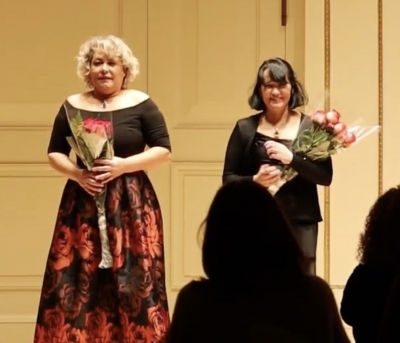
Irina and Halida Dinova after their Carnegie Hall concert 10/16/2022.
IM: Marriage/family, and mountains - they are magnificent! I would love to live in NY but unfortunately, my husband has worked in Colorado all his career.
KP: Where are some of the places that you have performed in concert?
IM: KPOF Recital Hall (Denver, Colorado), Carnegie Hall (Weill), Erbanr Saal (Vienna, Austria), Grusin Hall (Boulder, CO), Conservatory of Performing Arts, Viterbo, Italy.
KP: I've been fascinated to discover that musical training in much of Europe seems to encompass a broader range of genres, not just one or another exclusively. I've reviewed several European classical artists who are also very well-versed in jazz - and jazz artists who are very well-versed in classical music. Is that true in Russia, too, or are classical and jazz treated as different and separate genres, as they seem to be here in the US?
IM: When I studied for my degrees in Russia, jazz was treated very poorly unfortunately. Nowadays it is different - jazz is very well-respected, developed and appreciated.
Traditions that value classical music across the world are tremendous, though - it is eternal. Some of the valuable things classical music carries are beautiful melodic shapes, demanding technique (which awakens the emotional part of the brain), and its developed structural forms.
KP: As I remember, my own piano teacher forbade her students to improvise and I've always resented that. What was your experience with improv?
IM: I might say, I walked away from this style of teaching a long time ago. I do teach all my students how to improvise and think it is an extremely important element in musical education.
KP: Good to hear and I agree! Do you compose music, too?
IM: I do, and that will probably be my next project. I would say that all of a sudden, it is harder for me to become a greater composer than a performer. You have to study compositional techniques, and if you compose film scores, you have to learn software and purchase it. The software is expensive and so is film scoring studio equipment.
KP: That makes it difficult to even get started, doesn't it? Let's talk about your background a bit. Where were you born? Did you grow up in a musical family?
IM: I was born in Central Asia and my mom was Professor of Music at Qazaq State conservatory.
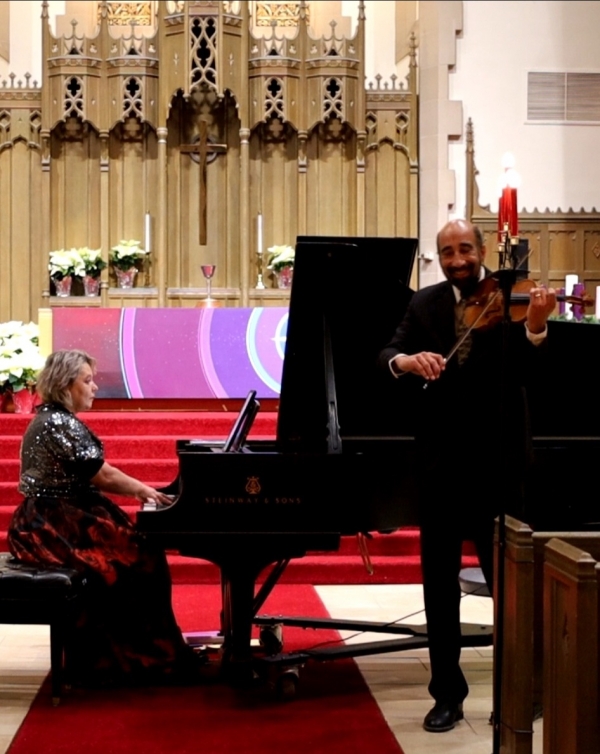
Irina with Dr. Gregory Walker, Professor of Violin at UCD.
KP: When did you start playing the piano? Where did you study?
IM: I started at 6 years old in Central Asia, and proceeded with my education in St. Petersburg and Moscow (Russia); I also spent one semester in Switzerland.
KP: Has it been difficult to be accepted as a female classical artist? I think it's easier now than it used to be, but it still seems more difficult for a lot of aspiring classical women artists to be taken as seriously as their male counterparts. What has been your experience?
IM: In classical styles, I don't think it is difficult to be recognized as a performer, maybe it is more difficult to be recognized in the world of academia. In jazz, per my observation, it is extremely difficult to be recognized as a female piano artist. I don't think it's as difficult for a jazz vocalist, though.
KP: Interesting! Who are some of your favorite composers?
IM: Chopin, Rachmaninoff, Bach, Gershwin, Copland, Bernstein, Louis Armstong, Chick Corea, Keith Jarrett, John Williams, Hans Zimmer.
KP: That's an eclectic group! What do you like to do when you're not teaching or playing the piano?
IM: I do like exercising, travel, cooking, cycling, meeting with friends.
KP: Are your children musicians?
IM: Both of my kids were in music until they graduated from college, but they did not pursue music as a profession.
KP: Who and/or what have been your biggest musical influences?
IM: My mom- Professor Elvira Kirsanova, ...Anatoly Ugorski, Professor of Detmold Hohsholle .
KP: If you could have any three wishes, what would they be?
IM: I would like to make more income to be able to perform more in venues I like - in NYC perhaps or other countries and also record.
To be able to travel places I've never been. This also requires a lot of money.
I wish more younger musicians would listen to and play classical, jazz, other great music.
KP: Is there anything else you'd like to "talk" about?
IM: I would to thank Kathy Parsons for reviewing my albums and continuing to support my efforts in Performing Arts Society..
KP: You're very welcome, Irina! It's a pleasure!
For more information about Irina Moreland and her music, be sure to visit
her website and her
Artist Page here on MainlyPiano.com.
Kathy Parsons
March 2023

